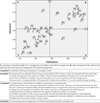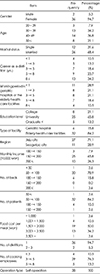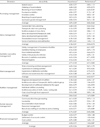Abstract
Purpose
This study analyzed job importance, job performance, and job satisfaction in 38 dietitians working at geriatric hospitals and elderly healthcare facilities in Jeju surveyed from September 15-24, 2014 with the aim of providing basic data for improving the quality of meals and nutrition management for elderly patients.
Methods
Data were analyzed using descriptive analysis, χ2-test, t-test, ANOVA, and Pearson's correlation coefficients using the SPSS Win program (version 12.0).
Results
Regarding job importance, the average score was 4.29 (out of 5), indicating that hygiene and safety management scored the highest at 4.77 (out of 5), and nutrition management scored the lowest at3.86. In terms of job performance of subjects, the average score was 2.87 (out of 5), indicating that cooking operation management scored the highest at 4.42 (out of 5). Regarding the Importance-Performance Analysis (IPA) of job importance and job performance, hygiene and safety management and cooking operation management scored high for importance and performance (B quadrant) menu management, human resource management, and nutrition management scored low for importance and performance (C quadrant) and purchasing management and financial management were included inD quadrant and A quadrant, respectively. For the level of job satisfaction of subjects, the average score was 3.37 (out of 5), indicating that relationships with colleagues scored the highest at 3.72, and improving professionalism scored the lowest at 2.95. Additionally, job importance and performance of subjects were positively correlated withjob satisfaction (r = 0.395, r = 0.386, both p < 0.05).
Conclusion
In conclusion, scores for job importance and job performance of nutrition management were low, and job satisfaction of improving professionalism scored low. Therefore, continuous training and education programs of nutrition management should be provided to improve professionalism of dietitians at geriatric hospitals and elderly healthcare facilities.
Figures and Tables
References
1. Son CS. A study on the long-term care insurance for the elderly. Korean Balance Dev Stud. 2011; 2(2):41–63.
2. Statistics Korea. Elderly statistics: 2014[Internet]. Seoul: Statistics Korea;2015. cited 2015 Dec 8. Available from: http://www.kostat.go.kr.
3. Kim MJ. The effects of geriatric hospital personnel's duty satisfactions on service quality [dissertation]. Daegu: Daegu Haany University;2009.
4. Ministry of Health and Welfare (KR). Survey on elderly life: 2011 [Internet]. Cheongwon: Ministry of Health and Welfare;2012. cited 2015 Dec 8. Available from:http://www.mohw.go.kr/front_new/jb/sjb030301vw.jsp?PAR_MENU_ID=03&MENU_ID=0328&CONT_SEQ=274151&page=1.
5. Yoon MO, Moon HK, Kim SY, Kim BH. Nutritional assessment and management in long-term care insurance's home visit care service. Korean J Community Nutr. 2013; 18(2):142–153.

6. Lee MS, Kim MH. Medical service satisfactions of main caregivers of elderly inpatients according to the grades of long-term care hospitals. Glob Health Nurs. 2013; 3(2):73–81.
7. Seo YJ, Oh JY. Determinants of job satisfaction among workers at elderly care hospitals. Korean J Hosp Manage. 2008; 13(2):64–85.
8. Health Insurance Review & Assessment Service(KR). Medical information [Internet]. Wonju: Health Insurance Review & Assessment Service;2012. cited 2015 Dec 20. Available from: http://www.hira.or.kr.
9. Health Insurance Review & Assessment Service(KR). Medical statistics information [Internet]. Wonju: Health Insurance Review & Assessment Service;2014. cited 2015 Dec 20. Available from: http://opendata.hira.or.kr/home.do#none.
10. Joo NM, Chon HJ. Analysis of the foodservice management in the welfare facilities for the elderly. Korean J Soc Food Sci. 1997; 13(4):453–461.
11. Shin KE. A study on dietitian's job status at the elderly welfare facilities [dissertation]. Pocheon: Daejin University;2007.
12. Jeju Special Self-Governing Province(KR). The status of elderly welfare facilities [Internet]. Jeju: Jeju Special Self-Governing Province;2014. cited 2016 Jan 22. Available from: http://www.jeju.go.kr.
13. Hong SY, Seo S. Job performance frequency and the training needs of dieticians in elderly healthcare facilities. J Korean Diet Assoc. 2010; 16(2):160–177.
14. Cho EH, Chang HJ, Kwak TK. Analysis of the job activities and demand of dietitian in the elderly health-care facilities. J Korean Diet Assoc. 2006; 12(4):313–328.
15. Kim NY, Seong GM, Lee JS. Job performance, perception of job importance, and job satisfaction in dietitians working in geriatric hospitals in Busan. J Korean Diet Assoc. 2012; 18(4):356–371.

16. Park MS, Lyu ES. Importance and performance of dietitian's task at long term care hospital foodservice in Busan · Kyungnam area. Korean J Community Nutr. 2011; 16(5):602–612.

17. Lee MJ, Lee YK. Effects of job characteristics, job performance and organizational commitment on job satisfaction of hospital dietitians in the Taegu · Kyungpook area. Korean J Community Nutr. 2000; 5(4):672–682.




 PDF
PDF ePub
ePub Citation
Citation Print
Print








 XML Download
XML Download